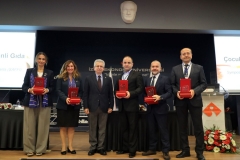
VOCATIONAL SCHOOL OF HEALTH SERVICES
Department of Child Development
CG 102 | Course Introduction and Application Information
| Course Name |
Child Development II
|
|
Code
|
Semester
|
Theory
(hour/week) |
Application/Lab
(hour/week) |
Local Credits
|
ECTS
|
|
CG 102
|
Spring
|
3
|
0
|
3
|
5
|
| Prerequisites |
None
|
|||||
| Course Language |
Turkish
|
|||||
| Course Type |
Required
|
|||||
| Course Level |
Short Cycle
|
|||||
| Mode of Delivery | Blended | |||||
| Teaching Methods and Techniques of the Course | Group WorkLecture / Presentation | |||||
| Course Coordinator | ||||||
| Course Lecturer(s) | ||||||
| Assistant(s) | - | |||||
| Course Objectives | The aim of this course is to learn child’s social, emontional, moral and sexual development and how to follow them, and assessment and evaluation instruments for evaluation of child development. |
| Learning Outcomes |
The students who succeeded in this course;
|
| Course Description | This course is a continuation course and covers different perspectives on child development, all areas of development and the stages in the pre-school period. |
|
|
Core Courses |
X
|
| Major Area Courses | ||
| Supportive Courses | ||
| Media and Management Skills Courses | ||
| Transferable Skill Courses |
WEEKLY SUBJECTS AND RELATED PREPARATION STUDIES
| Week | Subjects | Related Preparation |
| 1 | Language Development in Early Childhood | Infants and Children (Laura Berk) s: 236-242 |
| 2 | Theories of Early Language Development | Infants and Children (Laura Berk) s: 236-242 |
| 3 | Attachment Theory | Infants and Children (Laura Berk) s: 265-274 |
| 4 | Attachment and Parenting Styles | Infants and Children (Laura Berk) s: 265-274 |
| 5 | Ecological Systems Theory | Early Childhood Development(Jeffrey Trawick-Smith) s:58-61 |
| 6 | Self-Concept and Development | Infants and Children (Laura Berk) s: 360-366, 480-485 |
| 7 | Temperament | Early Childhood Development(Jeffrey Trawick-Smith) s:184-186 |
| 8 | Midterm Exam | |
| 9 | Family, Enviroment and Socialization | Infants and Children (Laura Berk) s:92-100 |
| 10 | Social Development During Pre-School Period | Infants and Children (Laura Berk) s:269-280 |
| 11 | Factors Affecting Social Development | Infants and Children (Laura Berk) s:364-372 |
| 12 | Sociocultural theory | Early Childhood Development(Jeffrey Trawick-Smith) s:51-56 |
| 13 | Families in cultural context | Early Childhood Development(Jeffrey Trawick-Smith) s:483-487 |
| 14 | Sexual Development and Processes | Infants and Children (Laura Berk) s:505-507 |
| 15 | Review of the course | |
| 16 | Final Exam |
| Course Notes/Textbooks | Laura E. Berk . ( 2013)Infants and Children: Prenatal Through Early Childhood.Çev. Nesrin ISIKOGLU ERDOGAN / ISBN: 9786051334042. Trawick-Smith J. (2013) Early Childhood Development. Çev. Berrin Akman ISBN: 9786051334783. |
| Suggested Readings/Materials | Nuray SENEMOĞLU (2005). Gelişim, Öğrenme ve Öğretim Kuramdan Uygulamaya. Anı Yayıncılık, Ankara. ISBN: 9786051701943 |
EVALUATION SYSTEM
| Semester Activities | Number | Weigthing |
| Participation |
1
|
10
|
| Laboratory / Application | ||
| Field Work | ||
| Quizzes / Studio Critiques | ||
| Portfolio | ||
| Homework / Assignments |
1
|
30
|
| Presentation / Jury | ||
| Project | ||
| Seminar / Workshop | ||
| Oral Exams | ||
| Midterm |
1
|
20
|
| Final Exam |
1
|
40
|
| Total |
| Weighting of Semester Activities on the Final Grade |
3
|
60
|
| Weighting of End-of-Semester Activities on the Final Grade |
1
|
40
|
| Total |
ECTS / WORKLOAD TABLE
| Semester Activities | Number | Duration (Hours) | Workload |
|---|---|---|---|
| Theoretical Course Hours (Including exam week: 16 x total hours) |
16
|
3
|
48
|
| Laboratory / Application Hours (Including exam week: '.16.' x total hours) |
16
|
0
|
|
| Study Hours Out of Class |
15
|
2
|
30
|
| Field Work |
0
|
||
| Quizzes / Studio Critiques |
0
|
||
| Portfolio |
0
|
||
| Homework / Assignments |
2
|
15
|
30
|
| Presentation / Jury |
0
|
||
| Project |
0
|
||
| Seminar / Workshop |
0
|
||
| Oral Exam |
0
|
||
| Midterms |
1
|
17
|
17
|
| Final Exam |
1
|
20
|
20
|
| Total |
145
|
COURSE LEARNING OUTCOMES AND PROGRAM QUALIFICATIONS RELATIONSHIP
|
#
|
Program Competencies/Outcomes |
* Contribution Level
|
||||
|
1
|
2
|
3
|
4
|
5
|
||
| 1 | To have the required contemporary theoretical and practical knowledge in his/her field |
X | ||||
| 2 | To use the material and technology related to his/her field, and make their maintenance, use the information and communication technologies at basic level |
X | ||||
| 3 | To have the competency to recognize the problems in his/her field, analyze them, develop evidence-based solutions and have the ability to share their suggestions with others |
X | ||||
| 4 | To be aware of legal responsibilities, conduct basic studies in her/his field independently |
|||||
| 5 | To communicate with patients, relatives and colleagues properly, comprehensively, honestly and explicitly, transfer his/her thoughts and knowledge through written and oral communication |
X | ||||
| 6 | To take responsibility as an active team member during the practices in his/her field |
|||||
| 7 | To commentate and evaluate the scientific information with a critical approach by the help of knowledge gained in his/her field |
X | ||||
| 8 | To comprehend the importance of lifelong learning, to determine and meet her/his learning needs, to develop herself/himself by monitoring the development in science and technology |
|||||
| 9 | To act by considering the universal ethical values, social and cultural characteristics |
|||||
| 10 | To know the concepts of occupational safety, patient safety, environmental protection and quality, and fulfill the requirements |
|||||
| 11 | To be able to follow information in his field and communicate with colleagues in English at least a level of European Language Portfolio A2 General Level |
|||||
| 12 | To have the skills of improving the development and learning of children with special needs |
|||||
| 13 | To plan and carry out activities for development of people under their responsibility |
|||||
*1 Lowest, 2 Low, 3 Average, 4 High, 5 Highest


